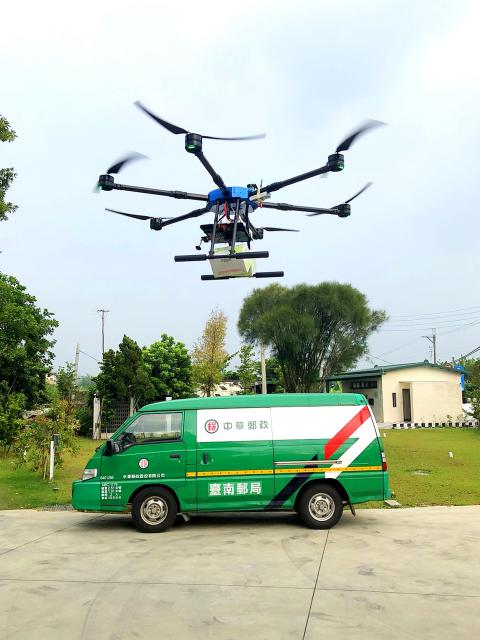The Ministry of Transportation and Communications is to expand a test program to deliver packages to remote communities using uncrewed aerial vehicles (UAV), ministry officials said.
The program’s initial test in October last year delivered a package from Tainan’s Zuojhen District (左鎮) to the office of National Development Council Minister Chen Mei-ling (陳美伶) in Taipei in two days, Department of Post and Telecommunications officials said.
The improved speed and cost-effectiveness of drones in delivering mail and agricultural goods could be a boon to the economies of remote communities, they said.

Photo courtesy of the Ministry of Transportation and Communications
The ministry’s plan for this year is to open more routes for drone mail delivery, study the commercial viability of using drones to move goods and use a fleet of drones for serum deliveries, they said.
The ministry early this month is to begin charting and drafting flight paths for mail delivery in Chiayi County’s Alishan (阿里山), they said.
The experiment in Zuojhen and Alishan is to determine whether agricultural produce — such as Alishan’s famed tea — could be transported by drones at a reasonable cost, Department Director Hsiao Chia-an (蕭家安) said.
“We need to learn from the experience of foreign countries before the program could be expanded into a regular service,” he said, adding that based on “the department’s initial assessment, the program is viable.”
Delivery precision and insurance are the most significant challenges at the moment, Hsiao said.
Aside from mail, the ministry’s drones are to airlift serums to mountain villages and townships enrolled in the program in cooperation with the Centers for Disease Control, department technician Wu Kun-yen (吳昆諺) said.
Depending on Chunghwa Post’s cost-benefit analysis, either Taichung’s Lishan (梨山) or Hsinchu County’s Jianshi Township (尖石) would be selected as the new location for drone mail delivery this year, with the trial being held for at least one year, Wu said.
The company is observing remote rural communities’ demand for postal deliveries, Chunghwa Post associate manager Kuo Chun-yang (郭純陽) said.
Most regions in the nation have robust transportation networks and fully replacing land mail with air mail has yet to be proven to be feasible, in terms of management and economies of scale, he said.
With the Civil Aeronautics Administration (CAA) poised to announce new regulations for UAVs in July, the agency’s Flight Standards Director Clark Lin (林俊良) said that government agencies and other public institutions should expect to follow more stringent standards than private citizens.
Government organizations would have to register the dimensions, weight and other specifications of the drones they employ for air pollution detection, pesticide spraying, and emergency relief and rescue, he said.
Private individuals are forbidden to operate drones above 400 feet (122m) or at night, but corporations can apply for exemptions, except for the restriction on flights over large crowds, he said.
Although the new regulations have yet to take effect, flight plans and routes over towns or cities still have to be approved by the CAA for safety reasons, Lin said.

Taiwanese can file complaints with the Tourism Administration to report travel agencies if their activities caused termination of a person’s citizenship, Mainland Affairs Council Minister Chiu Chui-cheng (邱垂正) said yesterday, after a podcaster highlighted a case in which a person’s citizenship was canceled for receiving a single-use Chinese passport to enter Russia. The council is aware of incidents in which people who signed up through Chinese travel agencies for tours of Russia were told they could obtain Russian visas and fast-track border clearance, Chiu told reporters on the sidelines of an event in Taipei. However, the travel agencies actually applied

Japanese footwear brand Onitsuka Tiger today issued a public apology and said it has suspended an employee amid allegations that the staff member discriminated against a Vietnamese customer at its Taipei 101 store. Posting on the social media platform Threads yesterday, a user said that an employee at the store said that “those shoes are very expensive” when her friend, who is a migrant worker from Vietnam, asked for assistance. The employee then ignored her until she asked again, to which she replied: "We don't have a size 37." The post had amassed nearly 26,000 likes and 916 comments as of this

New measures aimed at making Taiwan more attractive to foreign professionals came into effect this month, the National Development Council said yesterday. Among the changes, international students at Taiwanese universities would be able to work in Taiwan without a work permit in the two years after they graduate, explainer materials provided by the council said. In addition, foreign nationals who graduated from one of the world’s top 200 universities within the past five years can also apply for a two-year open work permit. Previously, those graduates would have needed to apply for a work permit using point-based criteria or have a Taiwanese company

The Shilin District Prosecutors’ Office yesterday indicted two Taiwanese and issued a wanted notice for Pete Liu (劉作虎), founder of Shenzhen-based smartphone manufacturer OnePlus Technology Co (萬普拉斯科技), for allegedly contravening the Act Governing Relations Between the People of the Taiwan Area and the Mainland Area (臺灣地區與大陸地區人民關係條例) by poaching 70 engineers in Taiwan. Liu allegedly traveled to Taiwan at the end of 2014 and met with a Taiwanese man surnamed Lin (林) to discuss establishing a mobile software research and development (R&D) team in Taiwan, prosecutors said. Without approval from the government, Lin, following Liu’s instructions, recruited more than 70 software